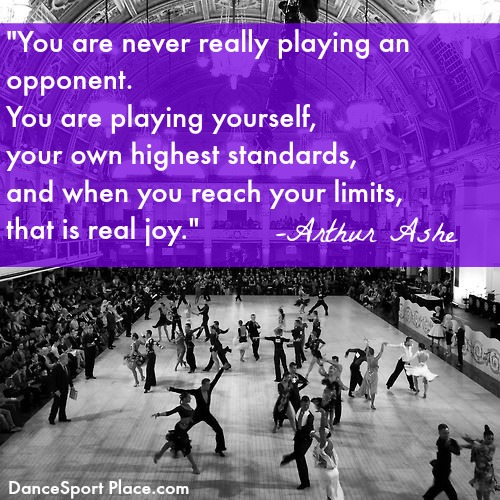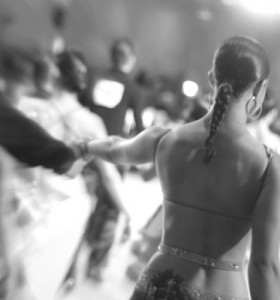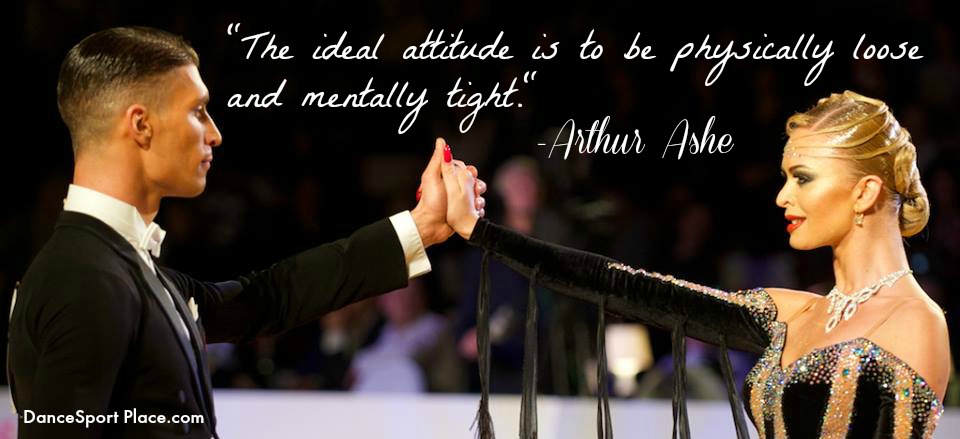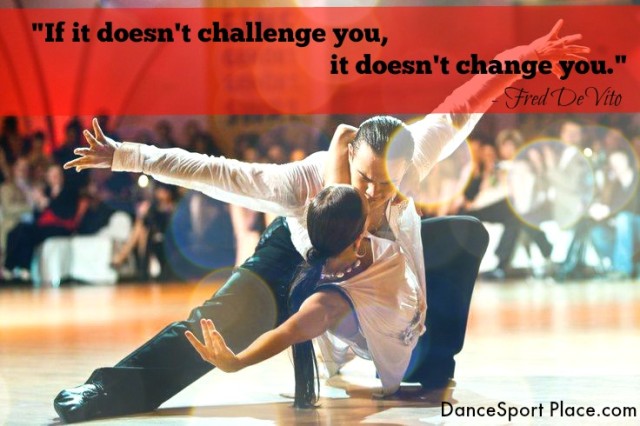In the high intensity world of Dancesport, keeping your placements in perspective is a real challenge. Sometimes it can feel like there’s one winner and everyone else is a loser. If you’re the winner—you’re riding high. Even if it’s just one placement ahead of where you were in the past. On the flip side, how many times have you come off the floor after awards feeling deflated, defeated or downright upset?
Then you run to the see the marks and make projections based on who marked you well and who didn’t…
they’re supporting some other couple
they don’t know what they’re looking at
—or worse,
they hate us
Win or lose, we make it mean something about us and about the other people involved. As human beings it’s our nature to make meaning out of everything that happens to us in life. That meaning—the one we assign to events in our lives—is shaped by our mental/emotional patterns. It’s why two people can experience the same event, but one person will suffer and the other feels grateful.
Your mental/emotional patterns start forming in early childhood. It’s a very powerful force in your lives because it exists in the subconscious. Most people never take the time to understand their mental/emotional patterns. As a result, their emotions often get in the way of peak performance.
You don’t have to be a victim of your conditioning.
Ballroom Dancers! You can train your brain for success!
Empowering your subconscious for success starts with understanding what drives it. According to Human Needs Psychology, there are six primary human needs, and we all spend our lives trying to fulfill them. The first four must be met to survive, the last two are needs of the spirit and satisfying them will create fulfilling life experiences.
They are:
1. Certainty
the need for stability, order, things to be reliable and steadfast. Comfort, security and responsibility fall under his need. A person who prioritizes certainty dislikes change, desires control over their environment and prefers having a plan. They can get upset with themselves or others for things not going as they expect. People who put certainty first are likely to put material success above relationships or experiences. They can be controlling and stubborn.
2. Uncertainty
Variety is the spice of life
—right?
So as much as we need things to be comfortable, we also need some uncertainty or life would be boring. A person who prioritizes this need might like to changeup choreography or coaches, take risks and create drama.
3. Significance
the need to feel important, appreciated, respected, admired. (Hint—this is a big need for many competitors—since they are putting themselves on display.) A person who prioritizes this need may put material success above relationships and flaunt who they know.
They like others to know who they are and what they have accomplished. They can be self-aggrandizing and have inflated egos.
4. Love and Connection
we all need love. Babies would never make it to adulthood if love weren’t present. Even people who say they don’t need other people need some kind of connection to survive and must have it to thrive. A person who prioritizes this need places relationships first and values personal time with others.
5. Growth
if we aren’t growing, we are dying. Growth drives you to learn new things, expand your knowledge and abilities, and to reach your potential. It keeps you flourishing. A person who prioritizes the need for growth loves to learn, and seeks ways to expand their influence.
6. Contribution
the need to share what you have with others, to make a positive impact on the world around you and to give without receiving in return. A person who prioritizes contribution is generous with their resources and is collaborative.
How Will You Train Your Brain?
We tend to prioritize two needs more than the others. How we prioritize those primary needs totally influences our lives. It sets up our value and belief systems. A person who prioritizes certainty and significance will have a very different life than someone who has contribution and growth as their primary needs.
What matters for the purposes of this post is, we can still reorder those priorities and empower our subconscious for success and fulfillment.
Prioritize for Progress
Take a look at the list of needs and ask yourself—honestly—what are your priorities? You may think you’re prioritizing one need, but if you look at your behavior you may find that your actions say different.
For example, you may feel that your driving need is for growth, since competitive dancing demands that you increase your skills and continue to learn. But in reality you may make significance your top need. That would explain why your ego swells when you win (and you feel dejected when you don’t!)
There is nothing wrong with having feelings about your placements, it’s how those feelings impact your life and relationships that really matters. In any sport, the mental and emotional game is as important as the physical one; that’s especially true in Dancesport.

If you flipped your top need from significance to growth, you would focus more on what you can learn and how you can improve from the experience, rather than blaming yourself, your partner or the judges.
Flex Your Brain Muscles!
As a dance teacher and coach, I love working with my students on technique, but I often feel the most important contribution I make is to help dancers understand what drives them so they can transform limiting beliefs and habitual emotions into sources of great strength.
Mental and emotional intelligence will empower your success on the competition floor and give you longterm fulfillment. Understanding these needs can help you better relate to your partner, friends and loved ones. Everyone is trying to meet their needs, sometimes in a positive way and sometimes in a negative way.
Dancing-A Positive Addiction
By the way, anything that meets at least 3 of our needs at a high level becomes an addiction. That’s why it’s so easy to become addicted to dancing.
When I dance, I am certain I will feel good. I love the variety of dancing with different partners and to different styles of music, I feel significant because I have a certain level of proficiency and receive admiration for my skills, I get lots of connection through my partners and the community. I’m growing as I learn more, and as a teacher I get to make a contribution by sharing the joy I get from dance with the world.
Needless to say, I’m hooked!
- Ballroom Dancers: Train Your Brain for Success - July 3, 2014

we respect your privacy and will never share your information! Unsubscribe at any time.






Hi Mary. Thank you for sharing your knowledge. I am truly with you when you say that “mental intelligence will empower your success in the competition floor”. For sure mental training is a very important factor for the success of any dancesport dancer.
Please take a look at my website on this subject. I would love to get a comment from you > http://www.jcapela.com
Joao